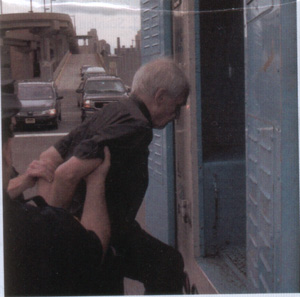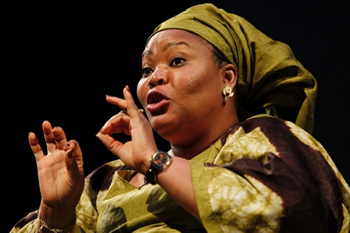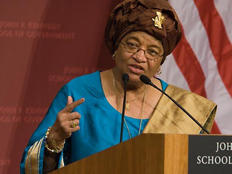Tears of Despair, Dreams of Laughter
For Sunday December 11, 2011
Third Sunday in Advent
Lectionary Readings (Revised Common Lectionary, Year B)
Isaiah 61:1–4, 8–11
Psalm 126 or Luke 1:47–55
1 Thessalonians 5:16–24
John 1:6–8, 19–28
About a month ago I had a dream that made me laugh out loud in my sleep. I can't remember what part of the dream made me laugh, nor can I remember that ever happening before. I just remember laying in bed and thinking how wonderfully strange it felt. You have hundreds of anxiety dreams that are rooted in fear, fears that are both real and imagined, and then one night you bust out laughing in the middle of the night. It felt good.
I felt like the poet in Psalm 126 for this week: "When the Lord brought back the captives to Zion, / we were like men who dreamed. / Our mouths were filled with laughter, / our tongues with songs of joy." The psalmist isn't naive. He doesn't ignore the brutal realities of our human condition. His poem is based in national disaster and lost fortunes; it laments people who had been deported to captivity. We "sow in tears" and "go out weeping," he says, but nevertheless dream of laughter and joy.
 |
Daniel Berrigan back to jail. |
Isaiah similarly speaks of ruined cities and national grief, but prophesies about a time when gladness and beauty will overtake disgrace and despair. And in this week's gospel, John acknowledges the darkness of the world, but celebrates the light that darkness cannot overcome.
The psalmist and my dream remind me of a better way to live than the one of chronic anxiety. It isn't true that joy is unjustified in our unjust world. Nothing is too wonderful to be true, the novelist Ron Hansen once observed. There are more things that are true than human suffering, namely, that God speaks and acts.
The Jesuit priest and peace activist Daniel Berrigan (born 1921) reminds us in his Advent Credo that there are greater things that are true than injustice and futility:
It is not true that creation and the human family are doomed to destruction and loss —
This is true: For God so loved the world that He gave his only begotten Son, that whoever believes in Him shall not perish but have everlasting life;It is not true that we must accept inhumanity and discrimination, hunger and poverty, death and destruction —
This is true: I have come that they may have life, and that abundantly.It is not true that violence and hatred should have the last word, and that war and destruction rule forever —
This is true: Unto us a child is born, unto us a Son is given, and the government shall be upon his shoulder, his name shall be called wonderful councilor, mighty God, the Everlasting, the Prince of peace.It is not true that we are simply victims of the powers of evil who seek to rule the world —
This is true: To me is given authority in heaven and on earth, and lo I am with you, even until the end of the world.It is not true that we have to wait for those who are specially gifted, who are the prophets of the Church before we can be peacemakers —
This is true: I will pour out my spirit on all flesh and your sons and daughters shall prophesy, your young men shall see visions and your old men shall have dreams.It is not true that our hopes for liberation of humankind, of justice, of human dignity, of peace, are not meant for this earth and for this history —
This is true: The hour comes, and it is now, that the true worshipers shall worship God in spirit and in truth.
 |
Leymah Gbowee. |
Like the psalmist, Berrigan knows what it means to sow in tears and to go out weeping. A friend of mine once asked him how many times he had been jailed for the gospel. He replied, "not enough." But Berrigan also knows that beyond the brutal realism of tears and weeping there are dreams of joy and laughter.
In her memoir called Mighty Be Our Powers (2011), the Nobel laureate Leymah Gbowee describes how one night she had her own dream while sleeping on her office floor: "I didn't know where I was. Everything was dark. I couldn't see a face, but I heard a voice, and it was talking to me — commanding me: 'Gather the women to pray for peace!'" At 5 A.M. she woke up shaking, feeling like she had heard the voice of God.Peace was a distant dream for Liberians after fourteen years of savage civil war (1989–2003). By some estimates, ten percent of the population had been slaughtered. Twenty-five percent had fled the country. Starvation, systematic rape, torture, mutilation and Charles Taylor's cocaine-crazed child soldiers had traumatized the nation. Schools and hospitals closed. Rats and dogs ate the unburied dead who littered the streets. There was no water, electricity or phone service.
Later that morning Gbowee related her dream to the women at her Lutheran church. Sister Esther Musah, an evangelist, led them in prayer: "Dear God, thank you for sending us this vision. Give us your blessing, Lord, and offer us Your protection and guidance in helping us to understand what it means." What it meant was the start of the Liberian women's peace movement that ended the civil war.
About twenty Lutheran women began to gather every Tuesday at noon to pray. Sometimes they fasted. They invited other Christian churches. At one meeting Asatu spoke up: "I'm the only Muslim here, and we want to join this peace movement." "Praise the Lord!" shouted the Christian women. And so Muslim and Christian women formed an alliance. They shared their horror stories. Training sessions and workshops followed. They passed out brochures and marched to city hall. Three days a week for six months they visited the mosques, the markets, and the churches of Monrovia: "Liberian women, awake for peace!"
In the end, the women forced Charles Taylor to peace talks in Ghana, and then in Ghana they barricaded the do-nothing men in their plenary hall until they signed peace accords. After the 2003 accords, they were instrumental in disarming the country, registering voters, and electing Ellen Johnson Sirleaf as the first woman head of state in Africa.
 |
Ellen Johnson-Sirleaf speaks at Harvard. |
Who were these women? "I will say," says Gbowee, "they are ordinary mothers, grandmothers, aunts, sisters." They sowed bitter tears. They went out weeping. And they acted on their dreams of peace, joy, and laughter for their beloved country.
See Leymah Gbowee, with Carol Mithers, Mighty Be Our Powers, A Memoir: How Sisterhood, Prayer, and Sex Changed a Nation at War (New York: Beast Books, 2011), 246pp. For a film version of the Liberian women's peace movement see the documentary film Pray the Devil Back to Hell (available on Netflix streaming).
Image credits: (1) JonahHouse.org; (2) TheDailyBeast.com; and (3) Harvard Kennedy School.





